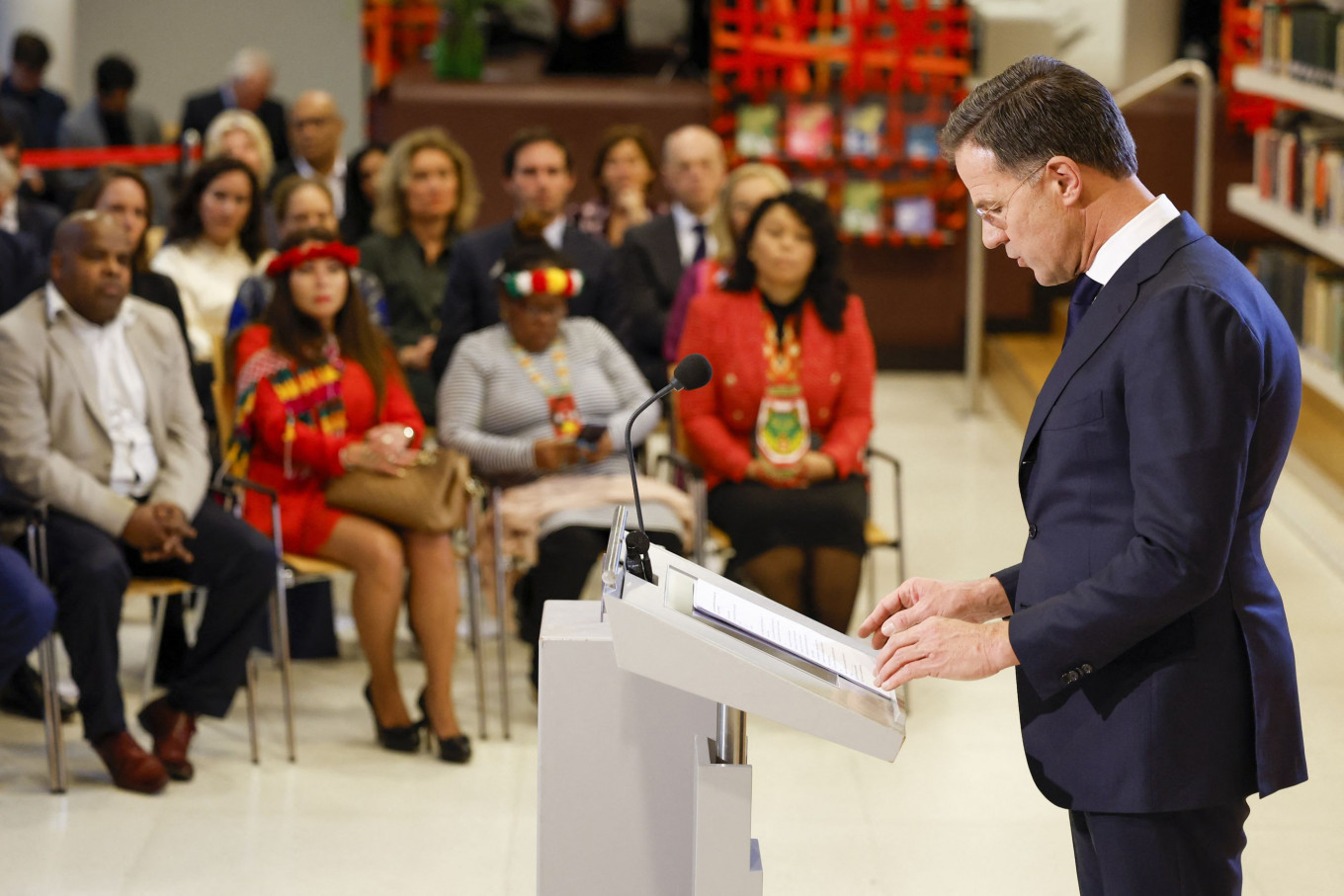Popular Reads
Top Results
Can't find what you're looking for?
View all search resultsPopular Reads
Top Results
Can't find what you're looking for?
View all search resultsDutch king says more to follow on slavery apology
RI will only respond to formal apologies: VP Ma’ruf.
Change text size
Gift Premium Articles
to Anyone
F
ollowing up on Dutch Prime Minister Mark Rutte’s speech seeking forgiveness for slavery, Dutch King Willem-Alexander said in his Christmas address that the government and the monarchy would remain invested in the matter beyond apologies.
A “long journey” is now in the pipeline for the Netherlands, said King Willem-Alexander, inferring that Rutte’s apology to the country's former colonies, particularly seven Caribbean states, for 250 years of slavery was only a beginning to a more elaborate process of reconciliation.
"Nobody today bears responsibility for the inhumane acts that were inflicted on the lives of men, women and children," Willem-Alexander said from his palace of Huis ten Bosch in The Hague on Sunday as quoted from AFP.
"But by honestly facing our shared past and recognizing the crime against humanity that is slavery, we lay the ground for a shared future, a future in which we stand against all modern forms of discrimination, exploitation and injustice."
"The apology offered by the government is the start of a long journey."
The Dutch government said several major commemorative events would be held from next year and has announced a 200 million euro (US$212 million) fund for social initiatives, AFP reported.
The leaders of Caribbean island Sint Maarten and of Suriname in South America have regretted the lack of dialogue from the Netherlands over the apology, according to AFP.
Lackluster effort
While not specifically mentioned, many Indonesians took Rutte’s speech as directed at Jakarta, as slavery was widely practiced in the country during Dutch colonial rule. On the line of this discernment, several politicians have conveyed disappointment and disapproval toward Rutte for his perceived lackluster effort, with the latest remark made by Vice President Ma’ruf Amin.
“If [Rutte] wishes to apologize, he should do so through official means to the Indonesian government. How the government responds will depend on subsequent discussions,” Ma’ruf said on Friday, as quoted from the Vice Presidential Secretariat website.
Ma’ruf’s sentiments are by no means isolated, as a considerable proportion of the Caribbean community, the primary recipients of Rutte’s apology, have expressed similar objections to the apology. But following up on the PM’s speech, Willem-Alexander said that both the government and the monarchy would continue to be invested in the matter.
Similar to Rutte’s speech, Willem-Alexander did not specifically mention how the Dutch government would follow up on its reflections, especially with regard to reparations and rehabilitation based on all-round consultation. Analysts have previously pointed to such lack of clarity as the primary contributor to the vapidity of the apology.
“What would the Netherlands do after apologizing? How would the responsibilities be manifested? Those questions are never clearly answered, except for the social initiatives fund that points to them wanting a non-judicial resolution,” Andi Achdian, a colonialism expert from the National University of Indonesia (UNAS) told The Jakarta Post last week.
“The speech tells me that these apologies are an end in themselves. [...] It is as if the Dutch government wants to reconcile with its dark history without necessarily taking responsibility.”
No ‘forgiveness’ just yet
Though experts and historians have asserted that the initial apology delivered by Rutte was by no means directed toward Indonesia, the speech has regardless inspired a fresh discourse on past sins committed by the Dutch East India Company (VOC) and the possibility of reparations.
So far, only two Dutch apologies have been addressed specifically to Indonesia, one for the systemic violence inflicted by their military during the independence war from 1945-1949, but to neither apology did the Foreign Ministry or the President make any response, given the unofficial aspect of the apologies.
TB Hasanuddin, a senior Indonesian Democratic Party of Struggle (PDI-P) politician who sits on the House of Representatives foreign affairs commission, said last week that Indonesia would only respond to any statement received through official diplomatic means, echoing the Vice President’s recent statement.
And a mere apology would fall far too short for Indonesia, several politicians have said, adding that there are still currently many invaluable cultural assets that remain in the possession of the Dutch. Furthermore, the fact that the Netherlands government still has yet to recognize Indonesia’s Independence Day of Aug. 17, 1945 remains a sore point for many in the country.
“There were a lot of natural resources of the former Dutch colonies that they plundered. This is something that should be talked about. They are heavily indebted [to their former colonies],” Golkar Party executive Nurul Arifin said recently.










